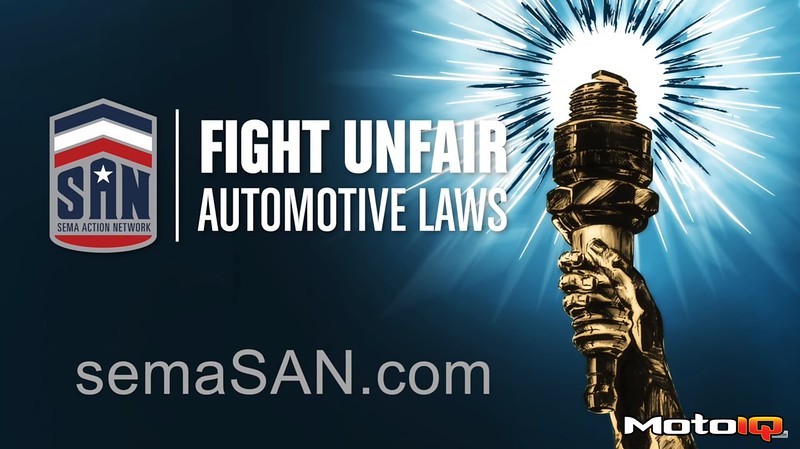
Save Our Cars and Our Industry – RPM Act of 2017
It is time to make our voices heard and protect our race cars! Though our industry made a lot of noise last year, it was not enough to get our bill passed. Thanks to the SEMA Action Network's efforts Representative Patrick McHenry (R-NC) and his colleagues have reintroduced the RPM Act. Right now the EPA maintains that it is illegal to convert a street car into a racecar and any company providing parts or services for these cars has engaged in an illegal act. This is unaccetable! So spread the word and use the provided link to send emails to your elected officials stating that we will not tolerate the EPA meddling with our cars or our industry!
The form is very easy to fill out. All you need to do is type in your name, email and addess and you can quickly send out an email to all your elected officals.
USE THIS LINK TO WRITE YOUR ELECTED OFFICIALS TO SUPPORT THE RPM ACT OF 2017
FAQ About the Recognizing the Protection of Motorsports (RPM) Act of 2017
While the U.S. Environmental Protection Agency (EPA) formally removed the race modification provision from its final greenhouse gas rule, the agency still asserts authority under the Clean Air Act to regulate the modification of vehicles used for competition. Congressional action is the ONLY way to guarantee that street vehicles can continue to be modified for the track.
1. What is the “Recognizing the Protection of Motorsports (RPM) Act”?
The “Recognizing the Protection of Motorsports Act” (RPM Act) is a bill that clarifies it has always been legal to modify a street vehicle into a racecar used exclusively at the track under the Clean Air Act. The bill also confirms that it is legal to manufacture, distribute, sell, and install race parts used to convert these vehicles for exclusive track use. Accordingly, these legitimate race parts businesses would not be subject to tampering penalties. The bill addresses any doubts regarding regulation of racecars and will provide certainty to the race parts industry.
2. Aren’t racecars already protected from being regulated by the U.S. Environmental Protection Agency (EPA)?
Congress exempted race vehicles from regulation under the Clean Air Act in 1970. However, in 2015, the EPA issued a proposed rulemaking stating that it has always been illegal to convert a motor vehicle into a racecar if the vehicle’s emissions system no longer remains in its certified configuration. The agency alleges that the Clean Air Act exemption only applies to purpose-built race vehicles (NASCAR, Formula One, sprint cars, etc.). EPA is also claiming authority over any emissions-related parts produced, sold or installed on a converted motor vehicle, which takes it out-of-compliance.
3. Didn’t the EPA withdraw its proposed racing regulation from the final greenhouse gas rule?
The EPA removed the problematic racecar language from the final greenhouse gas rule for trucks and buses but has not changed its policy. The EPA still maintains that any individual who converts a street vehicle into a racecar used solely on the track, and any business that makes or supplies the parts and services for these racecars has engaged in an illegal act of “tampering” if the emissions system is no longer compliant.
4. Which vehicles and parts would be impacted by the EPA’s new interpretation of the law?
The EPA’s enforcement authority could affect any vehicle, including sports cars, sedans and hatch-backs, that starts its life as a street car or motorcycle if it was originally certified to federal emissions standards. Federal emissions standards have been effective since 1968, so the EPA’s prohibition would cover all motor vehicles dating back to that year. Note, the EPA is not claiming authority over purpose-built racecars like those used today in NASCAR, or “nonroad vehicles” (dirt bikes, ATVs, snowmobiles and boats) that are used exclusively for racing.
The EPA’s new oversight covers any emissions-related component, which includes changes to engines, engine control modules, intakes, exhaust systems and more. The EPA may impose civil penalties of $4,454 per day, per violation.
5. Why is it important for Congress to pass this bill?
The public and regulated industry need certainty regarding how the Clean Air Act is applied, and Congress needs to confirm that it has ultimate authority. The RPM Act remains necessary to clarify the Clean Air Act, affirm Congress’ intent and ensure that racecars are exempt from EPA regulation now and in the future.
Converting a vehicle into a dedicated racecar is a key part of American heritage and provides jobs to thousands of hard-working Americans. Until now, it has been an unquestioned practice by enthusiasts, industry and regulators that has worked harmoniously with previous application of the Clean Air Act.
6. What is the impact on the racing industry if Congress doesn’t act?
Without congressional intervention, it remains unclear if the racing community and racing parts manufacturers are operating within the law and putting them at risk of enforcement. Further, if the EPA decided to enforce this authority, it would have a devastating impact on motorsports since many types of racing rely on vehicles that started their life on a production line. It would also decimate the industry that supplies the products used in motorsports. The specialty equipment automotive aftermarket employs about one million Americans across all 50 states. Current retail sales of racing products make up a $1.4 billion annual market.
Regulators have already targeted manufacturers, distributors and retailers under current Clean Air Act authority. Installers may be the next target. Even if the EPA doesn’t go after individual racers, products may begin to disappear from the supply chain. Legitimate racing products may no longer be developed and sold, and businesses may no longer be willing to modify vehicles.
USE THIS LINK TO WRITE YOUR ELECTED OFFICIALS TO SUPPORT THE RPM ACT OF 2017
For more information on the RPM Act be sure to follow the links below:
All you need to know about the RPM Act



